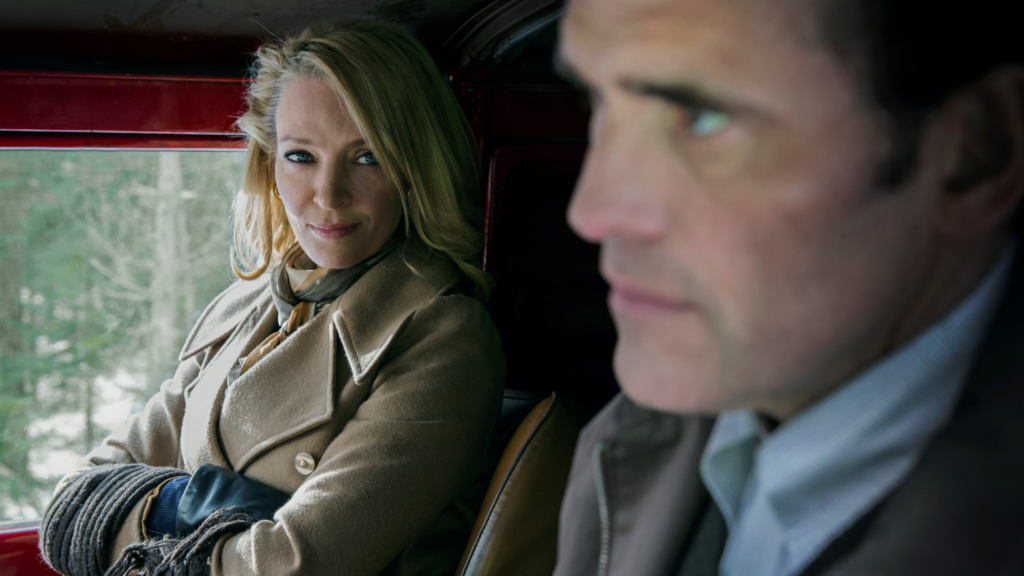The House That Jack built
2018

Rated: R
Country: Denmark, Sweden
Genre: Crime, Drama, Horror (Extreme Content)
Run-Time: 2h 32min
Director: Lars von Trier
Cast
Matt Dillon…………………Jack
Bruno Ganz……………….Verge
Uma Thurman………….Incident #1
Riley Keough………………Simple
Here is a tale that is literally is told from the depths of Hell.
It is time to talk about one of the most criminally overlooked movies in horror history, the spectacularly Satanic Lars von Trier serial killer epic, The House That Jack Built. (Honestly, this film is close as we might ever get to having a present day A Clockwork Orange.)
For anybody who doesn’t know, Lars von Trier is one of the most prolific filmmakers working in cinema today. He also has no issues flirting with extreme content. But his life and his career have been tragic. Trier suffers from OCD and depression. His movies, though becoming increasingly dark, made him a critical darling of Cannes until in 2011, when he got annoyed at a reporter who asked a question that associated his filmmaking techniques to Nazi propagandists, causing him to sarcastically remark that now that he knows he is German, he sympathizes with Hitler. (Lars was raised Jewish but learned as an adult that the man he thought was his father was not actually his biological father, and that his biological father was German.) It was an unfortunate incident that made Trier an instant pariah and caused him to be temporarily banned from the festival. So, what does this little anecdote have to do with Trier’s 2018 film The House That Jack Built. Actually a lot.
With a 2 hours and 32 minutes run-time, The House That Jack Built is remarkably ambitious in scope. Matt Dillon shines in his role as Jack, a sociopathic engineer who suffers from OCD. The film starts in darkness, with Jack seemingly having a conversation with a priest named Verge in a confessional. But Jack is not interested in repentance. He is there to talk about his thoughts on life and art, leaving Verge to play the role of devil’s advocate. Jack considers himself to be an artist, but his art is serial killing… with a touch of photography. To help make Verge clearly understand his point-of-view, Jack tells him about five incidents during his twelve-year killing spree (at one point we learn he has killed over sixty people) that he says he chose at random.
The House That Jack Built is mostly episodic. When Trier shows us the incidents of Jack committing his crimes, it is hard not to think of the film as serial killer film Quentin Tarantino never made. Jack is brilliant, and his OCD makes him meticulously careful, but, like those best moments in Tarantino’s work, things often still go comically wrong. Dillon is outstanding in those scenes where Jack finds himself cornered. Like a perfect sociopath, Jack always keeps his cool, choosing to lie his way out of any situation. This makes the film extremely entertaining. But it is also occasionally a tough to watch. Jack is a particularly cruel anti-hero, and since we are watching things from his perspective, I would not blame anyone for feeling a bit dirty while watching this film. (Personally, I would recommend watching this one alone. If you see this film with a date, they will wonder about you.)
Trier lays out each incident in an order that makes each one seems a little more horrible than the one before. Jack’s first kill is the most pedestrian, but the sequence is made memorable by a fantastic performance from Uma Thurman. The third and fourth incidents contain the most extreme content. Killing without consequence makes Jack grow bolder. Trier has a reputation for forcing a reaction, and in The House That Jack Built he expertly knows where, when and how to push on boundaries. Some of the sequences are definitely depraved, but, fortunately, I never felt like The House That Jack Built got so extreme that it reached my Martyrs, “Wow, I just hit my limit”, breaking point. Trier knows when to hold back too.
There is also a certain level of dark humour that comes through in The House that Jack Built. In the scenes between the segments, when Jack speaks to Verge, we often see images of Jack flipping cards to his narration as an intended allusion Bob Dylan’s “Subterranean Homesick Blues”. And a lot of Jack’s scenarios capture the I-just-shot-the-guy-in-my-car moments in Pulp Fiction. But Trier’s best joke comes when Jack talks about his “art” and Trier interjects a brief montage of his own filmography. Trier directly connections Jack to himself. So, when Jack starts to compare his art to world leaders that committed horrible atrocities, including Hitler, Trier is connecting his cannon to the comment which got him in so much trouble back in 2011. (Wow! He just double downed.) Obviously, this is an intentional troll move on Trier’s part, so there is little wonder why this film, which was originally touted as his comeback to Cannes, ended up keeping him in the doghouse. Of course anybody who knows anything about Trier should had never expected a sorry. This it is also filmmaking that shows a brilliant level of irony and self-awareness. In fact, a very good case can be made that Jack’s incidents are semi-autobiographical and serve as an allegory for Trier own artistic struggles. (Did you catch that both Jack and Trier suffer from OCD.) It is all so very meta.
But just in case any member of the audience somehow feels that The House That Jack Built is just not over the top enough, Trier adds an epilogue that transforms the film into a fantasy and gives Jack, who has been preaching his delicious brand of Satanism at us for over two hours, the ending he properly deserves. For some, it might be a bit too much. For me, the film could not have a more perfect ending.
Fortunately for Trier, I am pretty sure the vast majority of horror fans do not care about accolades at Cannes. They only care about whether a film is good or bad and its pretty obvious where I stand. Trier already raised eyebrows, and quite a bit of good-will in the horror community, when he made Antichrist, so I doubt that The House That Jack Built is done finding an audience. I personally cannot think of a single film that is more ripe for a positive retrospective re-evaluation. The House That Jack Built is one of the most underappreciated gems included on The Midnight Selections. It is a film that is sure to garner a strong reaction from anybody who watches, as it is probably the most ambitious, innovative and wonderfully nasty serial killer movie ever made. There are ideas and images, including that incredible lamp post analogy, that will forever stick with me. Horror films are increasingly becoming more sophisticated, so I do not doubt that the horror audience is as well. Do yourself a favour and watch this one. It is, for me, a quintessential modern horror masterpiece.
